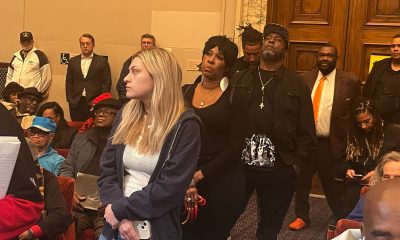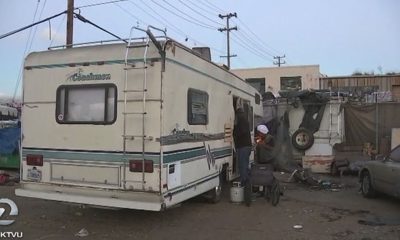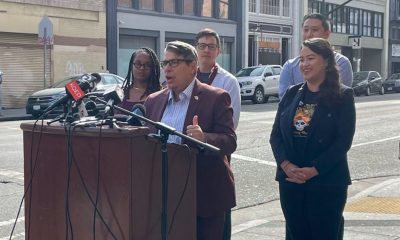Community
New Councilmembers Reid and Fife Pledge Action in 2021 on Housing, Homelessness

Treva Reid, District 7, and Carroll Fife, District 3, are the two new City Councilmembers elected in November pledging to use the power and resources of local government to help Oaklanders turn a corner on the multiple, intertwined poverty-fueled crises that impact the city.
Among the issues their top priorities for 2021 are rampant homelessness and housing insecurity for many thousands more.
Reid, who is new to public office, formerly worked as a staff member for Assemblymember (now State Senator) Nancy Skinner. She notes that official homeless rates have increased by almost 50% from 2017-2019 and that 70% of those unhoused and unsheltered in Oakland are Black and primarily Black men.
“My goals are strategic community-driven approaches to addressing some of the challenges before us,” she said.
Many families can’t pay the rent, have been forced out of the market, and many homeowners are worried about losing their homes to predatory actors much like in the past recession….We must actually implement and fund policies that reflect that Black lives really matter,” Reid said.
Below are some of her proposed solutions:
- Examine the budget to reallocate funding to produce, protect, and preserve affordable housing; prioritize the use of public land and increase the Housing Trust Fund.
- Fully utilize the three hotels leased in partnership with Alameda County and the state. Also, secure funding to purchase underutilized hotels and convert vacant property to provide housing.
- Remove barriers and enforce policies to ensure residents with criminal records can access secure permanent housing.
- Change restrictive zoning to allow churches and places of worship to build low-income homes and affordable units on their property.
- Expedite completion of 25 tiny homes being prepared to house young adults in District 7.
- More city-owned land for RV parking/shelter locations
- Pass and enforce laws to protect tenants from illegal evictions and advocate for programs to prevent homeowners from foreclosures.
- Launch the City of Oakland’s NOFA (Notice of Available Funding) to help fund a pipeline of new multifamily affordable housing.
- Advocate for tax abatements, increased federal and state funding for permanent subsidized low-income housing and affordable homeownership programs.
While new to the City Council, Fife has spent years at council meetings and organizing in neighborhoods, demanding affordable housing, fighting against displacement and pressuring banks and corporations to block housing foreclosures.
She is the director of the Oakland office for the Alliance of Californians for Community Empowerment (ACCE).
She recently won national attention as a leader with Moms 4 Housing, a group of women who occupied a vacant home in West Oakland last year that was owned by a real estate investment firm.
“In order to halt the tsunami of homelessness that is sweeping Oakland and other areas, we need to keep people from becoming homeless in the first place,” she said.
“Once they become homeless, it’s a lot harder to get them into adequate housing. This means stronger local and state laws protecting renters, “pushing back against companies that are trying to get as much money as they can” from their properties.
The community has to demand to protect renters after the moratorium on rents expire, she said.
People are going to need protections to keep from losing their homes. “In the 2008 crisis, we saw what happened. We can’t let that happen again,” Fife said. “Homeowners became renters, and many renters became homeless. The banks were bailed out. People need a bailout to prevent homelessness,” she said.
Recently, West Coast political leaders signed a letter calling for a federal bailout. ACCE was part of that.
The city needs a tough public land policy, Fife believes. “There should not be any sale of public land to private developers, unless it is to house the homeless,” she said.
“There should also be an audit of every empty space of and every empty parcel of public land so everyone can shelter in place,” she said. “That’s what is right for our overall health and safety during this public health crisis.
Fife pointed out that Oakland is the largest city in the county but does not receive from the county the investment that it needs in terms of resources, programs and funding.
If we understand that “housing is a human right,” said Fife, “we must understand” that housing can no longer be sold as an unregulated commodity or traded by speculators.
“Speculations hurt residents,” Fife said in an interview on KQED FM “Speculation harms entire communities and entire neighborhoods. When people are engaged in buying up residential property for the sole purpose of flipping it and making as much money as they can, then that leaves out an entire group of individuals who cannot compete in that type of market.”
Activism
Oakland Post: Week of July 24 – 30, 2024
The printed Weekly Edition of the Oakland Post: Week of July 24 – 30, 2024

To enlarge your view of this issue, use the slider, magnifying glass icon or full page icon in the lower right corner of the browser window. ![]()
#NNPA BlackPress
NNPA NEWSWIRE — Reflecting on his long career, Biden expressed deep gratitude and pride. “Nowhere else on earth could a kid with a stutter from modest beginnings in Scranton and Claymont one day sit behind the Resolute Desk in the Oval Office. But here I am. That’s what makes America special,” he remarked, his voice tinged with emotion.
The post first appeared on BlackPressUSA.

Biden: Our Democracy Demands New Leadership
By Stacy M. Brown, NNPA Newswire Senior Correspondent
@StacyBrownMedia
In an impassioned address from the Oval Office, President Joe Biden laid bare his decision to step down from the 2024 presidential race, urging Americans to embrace a new generation of leadership. “Saving democracy is more important than any title. It’s time to pass the torch to younger voices,” Biden declared in an address that signaled a transformative shift in American politics.
Following his decision over the weekend to bow out of the race for re-election, Biden’s announcement was a clarion call for renewal. Stressing the moment’s urgency, Biden emphasized that the future of democracy depends on fresh, dynamic leadership. He endorsed Vice President Kamala Harris as the embodiment of this new era. “Years ago, I described myself as a transitional candidate, and now it’s time for that transition to take full effect,” Biden said, positioning Harris as the future of the Democratic Party.
While refraining from mentioning former President Donald Trump by name, Biden clarified that he views the twice impeached and 34 times convicted felon Republican presidential nominee as a fundamental threat to democratic values. “My record as president, my leadership on the global stage, and my vision for America’s future all merited a second term,” Biden stated. “But nothing can stand in the way of safeguarding our democracy. That includes personal ambition. So, I’ve decided the best path forward is to pass the torch to a new generation.”
Reflecting on his long career, Biden expressed deep gratitude and pride. “Nowhere else on earth could a kid with a stutter from modest beginnings in Scranton and Claymont one day sit behind the Resolute Desk in the Oval Office. But here I am. That’s what makes America special,” he remarked, his voice tinged with emotion.
Biden acknowledged that doubts about his ability to defeat Trump influenced his decision. “I revere this office, but I love my country more,” he said. “It’s been the honor of my life to serve as your president. But in defense of democracy, which is at stake, I think it’s more important than any title.”
Biden said he is determined to address crucial issues for the remainder of his term. His agenda includes lowering family costs, defending personal freedoms, protecting voting rights, combating cancer, addressing gun violence, and advocating for Supreme Court reform. Internationally, he said he aims to strengthen NATO, support Ukraine, and seek an end to the conflict in Gaza.
Biden’s endorsement of Harris has galvanized the Democratic Party, with Harris swiftly securing the backing of a majority of Democratic delegates. “I’m not going anywhere,” Biden reassured his campaign staff, now supporting Harris. “I’m going to be out there on the campaign trail with her, working tirelessly as both a sitting president and a campaigner.”
The landmark address, along with Biden’s anticipated speech at the Democratic National Convention, could prove pivotal in defining his legacy. “In a few months, Americans will decide the direction of our nation’s future,” Biden stated. “I have made my choice. I’ve expressed my views. Now the decision is in your hands, the hands of the American people.”
In the days before his decision, Biden confided in close advisors about his concerns regarding another run against Trump. His acknowledgment of those doubts underscored his commitment to putting the country’s needs above his ambitions. “The defense of democracy must come before all else,” he reiterated.
As Biden prepares to support Harris in her campaign, he remains focused on his presidential duties. His administration continues to push for significant legislative achievements, reinforcing his enduring commitment to the American people. “In just a few months, the American people will choose the course of America’s future,” Biden said. “The great thing about America is here, kings and dictators do not rule. The people do. History is in your hands. The power is in your hands. The idea of America lies in your hands.”
The post first appeared on BlackPressUSA.
#NNPA BlackPress
PRESS ROOM: Reparations Movement Partners Globally Mourn the Passing of U.S. Congresswoman Sheila Jackson-Lee
NNPA NEWSWIRE — we acknowledge the powerful legacy of U.S. Congresswoman Sheila Jackson-Lee. She was a steadfast leader in the fight for reparatory justice, carrying forward the legislative baton from the late U.S. Congressman John Conyers in 2018.
The post PRESS ROOM: Reparations Movement Partners Globally Mourn the Passing of U.S. Congresswoman Sheila Jackson-Lee first appeared on BlackPressUSA.

[July 22, 2024 – Chicago, IL] With an extremely heavy heart and a profound sense of loss, we acknowledge the powerful legacy of U.S. Congresswoman Sheila Jackson-Lee. She was a steadfast leader in the fight for reparatory justice, carrying forward the legislative baton from the late U.S. Congressman John Conyers in 2018. Her relentless efforts nearly brought HR 40 to passage in the House of Representatives in 2022, missing by just one vote. Her leadership was pivotal in advancing the bill out of the Judiciary Committee in April 2021 after a historic debate. Even after her diagnosis, Rep. Jackson-Lee fiercely collaborated with reparations leaders, pushing for President Biden to establish an HR40-like commission by Executive Order. She believed this executive path was crucial for addressing centuries of injustice. Despite setbacks in meetings with the President’s team, she remained optimistic and urged us to stay ready for progress.
The Earn the Black Vote Collaborative formed in 2023 in response to her urging to continue the fight for reparations. On April 25, 2024, the Collaborative released a poll showing significant support for President Biden to issue an Executive Order for Reparations. Congresswoman Jackson-Lee championed the poll’s findings, emphasizing the critical importance of reparations to African American and progressive communities. Her vision was clear: an Executive Order to create a federal reparations commission could drive transformative Black voter turnout and move the ball toward justice. She had wanted the Executive Order done by Juneteenth. Tragically, just a month after Juneteenth, she left us. We have lost a great leader for reparatory justice. In honor of her legacy, we call for the establishment of the Executive Order by President Biden. We extend our deepest condolences to Representative Jackson-Lee’s family. We call on reparation activists, leaders, and legislators globally to stand with us as we honor her legacy. May the Ancestors and the Creator receive her with joy.
About the Author:
Kamm Howard is a national and international reparations scholar and activist working for over 20 years building grassroots movements to obtain reparations for African descendants in the United States.
CONTACT:
Reparations United Phone: 773-985-2990
Email: kamm@reparationsunited.org Website: https://reparationsunited.org/
The post PRESS ROOM: Reparations Movement Partners Globally Mourn the Passing of U.S. Congresswoman Sheila Jackson-Lee first appeared on BlackPressUSA.
-

 Arts and Culture3 weeks ago
Arts and Culture3 weeks agoRooted in Tradition: The Intricate History of Black Hair Braiding
-

 Bay Area4 weeks ago
Bay Area4 weeks ago“I Will Not Be Bullied,” Says Oakland Mayor Sheng Thao
-

 Bay Area2 weeks ago
Bay Area2 weeks agoPG&E Increases Rates While Bay Area Households Are Struggling to Stay Afloat
-

 Business3 weeks ago
Business3 weeks agoGov Newsom: Raising Fast Food Minimum Wage to $20 Pays Off as Jobs Multiply in Industry
-

 Activism4 weeks ago
Activism4 weeks agoOpponents of Mayor Sheng Thao Are Calling on Her to Resign Following FBI Raid
-

 Bay Area2 weeks ago
Bay Area2 weeks agoJuneteenth Mass Shooting Suspect Charge with Multiple Counts of Felony Assault by Alameda County DA Pamela Price
-

 Community1 week ago
Community1 week agoHundreds Come to Jehovah’s Witnesses’ Assembly Hall for Three-Day Program of ‘Good News’ in Fremont
-

 Activism4 weeks ago
Activism4 weeks agoOakland Coliseum Sale to AASEG: A Model for Community Development and Inclusion




















































